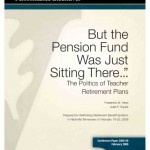“But the Pension Fund Was Just Sitting There…” – The Politics of Teacher Retirement Plans
 The tension at the heart of pension politics is the incentive to address today’s claimants and focus on the here-and-now at the expense of long-term concerns and more dispersed constituencies. In the private sector, rules and regulations seek to tame corner-cutting and short-sighted behavior. In the public sector, the primary safeguard is the self-discipline of public officials and the hope that they will not be unduly tempted by short-term electoral considerations or influential constituencies. Teacher pensions, in particular, pose two challenges for K-12 schooling. The first challenge is the political incentives that lead to irresponsible fiscal stewardship, as public officials make commitments to employees that outstrip the available funds. The second is that of electoral considerations which hinder modernization, as policymakers dance around existing structures built to serve an industrial-era workforce and ill-suited to attracting talent in the contemporary labor market. The alignment of the political stars has helped states and localities to address the first challenge, but there has been little evidence of a willingness to tackle the second. The authors examine the political control of public pensions, the influence of teacher associations, and the lack of institutional constraints on public officials to explain the severity of these challenges. Those dynamics are illustrated via discussion of fiscal crises in New Jersey, Oregon, and San Diego and the way in which those crises created opportunities for addressing enormous shortfalls in funding. The authors close by suggesting several measures that may encourage public officials to be more responsible fiscal stewards or to revisit anachronistic retirement systems in order to promote teacher quality.
The tension at the heart of pension politics is the incentive to address today’s claimants and focus on the here-and-now at the expense of long-term concerns and more dispersed constituencies. In the private sector, rules and regulations seek to tame corner-cutting and short-sighted behavior. In the public sector, the primary safeguard is the self-discipline of public officials and the hope that they will not be unduly tempted by short-term electoral considerations or influential constituencies. Teacher pensions, in particular, pose two challenges for K-12 schooling. The first challenge is the political incentives that lead to irresponsible fiscal stewardship, as public officials make commitments to employees that outstrip the available funds. The second is that of electoral considerations which hinder modernization, as policymakers dance around existing structures built to serve an industrial-era workforce and ill-suited to attracting talent in the contemporary labor market. The alignment of the political stars has helped states and localities to address the first challenge, but there has been little evidence of a willingness to tackle the second. The authors examine the political control of public pensions, the influence of teacher associations, and the lack of institutional constraints on public officials to explain the severity of these challenges. Those dynamics are illustrated via discussion of fiscal crises in New Jersey, Oregon, and San Diego and the way in which those crises created opportunities for addressing enormous shortfalls in funding. The authors close by suggesting several measures that may encourage public officials to be more responsible fiscal stewards or to revisit anachronistic retirement systems in order to promote teacher quality.
To read this paper, please click here.
To read comments on this paper, please click here.
Connect with Vanderbilt
©2026 Vanderbilt University ·
Site Development: University Web Communications